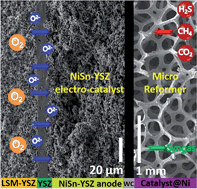Biogas to syngas: flexible on-cell micro-reformer and NiSn bimetallic nanoparticle implanted solid oxide fuel cells for efficient energy conversion†
Abstract
Solid oxide fuel cells (SOFCs) deliver an energy-efficient and eco-friendly pathway to convert biogas into syngas and electricity. However, many problems still need to be solved before their commercialization. Some of the disadvantages of biogas SOFC technology include coking and sulfur poisoning that lead to catalyst deactivation and large thermal gradients causing thermal stress. In this work, a novel on-cell micro-reformer and NiSn bimetallic nanoparticles were introduced into a conventional Ni-based anode for efficient and durable internal reforming of biogas. The add-on micro-reformer, consisting of tailored Ni foam supported NiSn/Al2O3 nanoclusters, exhibited excellent reforming activity and outstanding resistance to coking and sulfur poisoning. Thus, the pre-reforming process in the micro-reformer could effectively decrease the thermal gradients in the anode. Besides, the loosely filled nanoclusters showed high capability of releasing thermal stress due to their movable nature. Moreover, the yielded syngas was partially electro-oxidized in a coke/sulfur tolerant NiSn bimetallic anode to compensate the energy consumption and promote the conversion of biogas. At 850 °C and in a CH4–CO2-200 ppm H2S atmosphere, a peak power density as high as 0.946 W cm−2 was achieved. With a constant current density of 1.25 A cm−2, the CH4 conversion and CO selectivity remained at around 95% while processing a steady output voltage (0.69 V), demonstrating excellent activity and coke/sulfur tolerance that have rarely been reported. This work delivered an efficient way for biogas utilization in the context of efficient energy conversion technologies.


 Please wait while we load your content...
Please wait while we load your content...